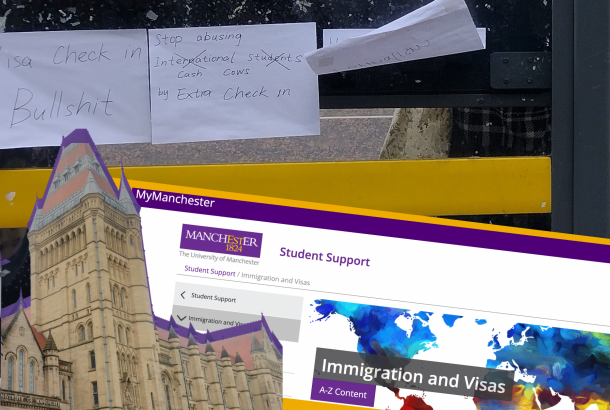Why is turnout so low at SU Elections?
By Josh Sandiford and Felix Hanif-Banks

Each year, students vote for the eight full-time executive officers to lead the University of Manchester Students’ Union (SU). These executives are meant to act as the leaders of the University’s student body, representing their concerns and enacting meaningful change that makes the University a more welcoming, inclusive and thriving space for all.
However, many students feel a lack of meaningful connection to their Students’ Union as they don’t see it as a body that adequately represents them. The physical Students’ Union building is often neglected by many students – even following massive renovations in the summer of last year – who work and eat in other more purpose-built spaces around the University.
Turnout has consistently proved to be a problem in recent elections. In 2018, just 19.8% of students voted – and this was amongst the highest in the country, with neighbouring Manchester Metropolitan University’s elections seeing a turnout of nearly 10%. The SU Elections rarely see significantly higher turnouts, with previous years recording figures of 16% in 2017 and 28% in 2016. Prior to that, 2015 was a record high of 34.4%, but the significant decline since then is telling.
Clarity of message appears to be the largest obstacle for many students, as apart from banners strung up around the SU itself, there is little information readily accessible to students. A second year History and Sociology student, Bethany Veal told The Mancunion, “[she] would vote if she knew what candidates stood for… to get mass turnout [this information] needs to be around campus.”
Information is present on the SU’s own website, but a part from that there’s little to grab people’s attention other than banners containing little information other than a name and a catchy slogan. Bethany went on to say, “There are lots of signs saying who to vote for outside the SU, but none stating a few points of anyone’s manifesto etc. The only times I have seen what people are standing for, without looking for it, is when I have been directly approached in the library etc, and candidates have been very pushy about you voting there and then, only knowing their mottos and issues they want to change.”
The issue of an information gap is evident and it’s hard to direct blame at either the SU, students, or candidates themselves. Students are obviously difficult to engage with meaningfully at the best of times, so expecting tens of thousands to actively search for and read through multiple manifestos online is a huge undertaking. This leads to the predatory practices experienced by Bethany and countless other students that arguably turns the elections into a glorified popularity contest as it becomes a test of who can hand out the most flyers in the library.
While individual candidates handing out freebies may not be the best method to ensure elections are run fairly, the Students’ Union itself has resorted to such tactics to encourage turnout. People voting on specific days can expect free food from SU kiosks such as a slice of pie or a portion of chips, and there are competitions where those who vote can win a £50 Uber voucher or guest list at an Academy gig. While this may be less corrupting than direct candidate influencing, it shows the lengths considered necessary to regain past levels of turnout or even surpass them.
This strategy does somewhat appear to be a sign of the SU clutching at straws with these elections, but other potential avenues remain unexplored. The Students’ Union Facebook page, which has over 50,000 likes, seems to be a pool of untapped potential. While the page is on a surface level extremely popular, posts regularly fail to achieve double-digit engagement, proving their strategies to inform Manchester’s student population aren’t successful.
A poll on Fallowfield Students’ Group of 83 people found that only 2 of those planned to vote in the upcoming elections. There are very few people with positive things to say about the SU election process as it seems to have alienated many. Nieve Elliott, a second year Politics student told The Mancunion, “issues the student union focuses on are not meaningful and far fetched”.
There seems to be a general feeling of a disconnect between the SU Exec team and their student body, as many are unaware of the impact they have or the roles they fulfil.
Improvements to the lack of communication could certainly be inspired by the efforts of other universities. For example, Liverpool’s Students’ Union has a clear, accessible page that directly lists the recent major contributions of their Exec team, meaning students can assess the work done by recent officers, giving them more information to help future votes and hold their SU accountable.
In a recent interview, the current International Students’ Officer, Riddi Viswanathan, was asked about low levels of voter turnout in previous SU elections. She pointed out that it could be an issue with the SU and suggested students might not be entirely to blame: “Maybe we haven’t communicated well about the impact that the leadership has on student life.
“That is an underlying problem with us and not a problem with students. Students would engage if we engaged with them and we should be looking to engage with them this year by [telling them about] the changes we have brought to their lives.”
When asked what her message would be to try and persuade students to vote, she said: “There are many incentives, including free giveaways of tea and chocolate. Candidates also give their own goodie bags away. Students should use [the elections] as an opportunity to get what they want out of the university and most importantly, [students should] look at the impact that student leaders have on their lives.
“Having a full-time International Officer role, having a full-time postgraduate role or even having lecture podcasts or increased numbers of gender-neutral toilets on campus. We are the ones that have been behind the scenes doing this for students and if students want to see more changes like these on campus then they should definitely vote.”







